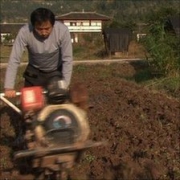Farm Extension Services: an Update
Two weeks ago, USAID held an event on the current initiatives using ICT to strengthen Farm Extension Services (FES). Judy Payne, ICT Advisor at USAID, was joined by Chris Locke, Managing Director GSMA Development Fund, to update the ICT4D community on new initiatives, approaches, and challenges in FES.
To start the discussion, Judy Payne provided an overview of some promising examples under USAID’s Fostering Agriculture Competitiveness Employing Information Communication Technologies Project (FACET). Some of these include Reuters Marketing Light, Mali Shambani, Community Knowledge Worker, Manobi, and Digital Green. She did not linger on the technicalities of these projects, opting to focus on how new technologies can complement traditional tactics for the most sustainable use.
 The combination of the “push” and “pull” information allows a feedback loop from the farmer to the organization, crucial for monitoring and evaluation. “Push” services are those are those that are being used to provide the farmer with information, such market information through SMS or voicemail. “Pull” services consists of the feedback from the farmer, such as their queries on demand in the market via SMS.
The combination of the “push” and “pull” information allows a feedback loop from the farmer to the organization, crucial for monitoring and evaluation. “Push” services are those are those that are being used to provide the farmer with information, such market information through SMS or voicemail. “Pull” services consists of the feedback from the farmer, such as their queries on demand in the market via SMS.
Ms. Payne asserted that the combination of new ICTs with more traditional tactics, such as face-to-face training and verbal feedback, are necessary for the most efficient implementation.
She also explained that collaborative new business models, such as sponsor mobile network operators (MNO) and farmer pay services, are non-agricultural components of FES that ensure well-defined distribution channels and access to users.
Chris Locke of the GSMA Development Fund echoed the importance of leveraging the private sector and combining ICT channels for FES in current e-agriculture projects.
The Development Fund works with mobile operators to accelerate mobile solutions for people living on under US$2 per day. They have been working with the Gates Foundation and USAID on a new e-agri initiative called mFarmer in Kenya and India.
Currently in its second phase of the project, the goal of the mFarmer program is to work with MNOs and partners to support the launch of quality agricultural value-added-services accessibly to over 2 million smallholder farmers. The program aims to provide a sustainable way for farmers to obtain critical agricultural information that can help them improve their farm productivity and income.
The role of GSMA in this program is to develop this content database for ICT-enabled farm extension services to share and create, but building alliances with local MNOs is equally important.
extension services to share and create, but building alliances with local MNOs is equally important.
Mr. Locke discussed how partnerships with local MNOs play a major role in disseminating information in developing areas. Local private sector involvement allows organizations to tap into previously established distribution channels that are culturally relevant and have widespread reach.
Unlocking the power of MNOs provides potential nation wide scalability. He argued these are distribution channels where:
Operators have the capacity to spread it across at a national level
Post-discussion, it was apparent (as it always is) that there has to be more than just the use of ICTs to help rural farmers in FES projects. ICT channels should be complemented with traditional tactics to heighten impact and sustainability; and organizations should establish alliances with local MNOs to leverage their local distribution channels.








































